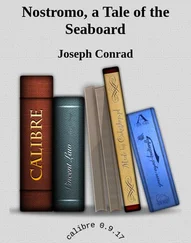The lowering daylight died out quickly, leaving him faced by a broken bridge. He descended into the ravine, forded a narrow stream by the last gleam of rapid water, and clambering out on the other side was met by the night which fell like a bandage over his eyes. The wind sweeping in the darkness the broadside of the sierra worried his ears by a continuous roaring noise as of a maddened sea. He suspected that he had lost the road. Even in daylight, with its ruts and mud-holes and ledges of outcropping stone, it was difficult to distinguish from the dreary waste of the moor interspersed with boulders and clumps of naked bushes. But, as he says, “he steered his course by the feel of the wind,” his hat rammed low on his brow, his head down, stopping now and again from mere weariness of mind rather than of body—as if not his strength but his resolution were being overtaxed by the strain of endeavour half suspected to be vain, and by the unrest of his feelings.
In one of these pauses borne in the wind faintly as if from very far away he heard a sound of knocking, just knocking on wood. He noticed that the wind had lulled suddenly.
His heart started beating tumultuously because in himself he carried the impression of the desert solitudes he had been traversing for the last six hours—the oppressive sense of an uninhabited world. When he raised his head a gleam of light, illusory as it often happens in dense darkness, swam before his eyes. While he peered, the sound of feeble knocking was repeated—and suddenly he felt rather than saw the existence of a massive obstacle in his path. What was it? The spur of a hill? Or was it a house! Yes. It was a house right close, as though it had risen from the ground or had come gliding to meet him, dumb and pallid; from some dark recess of the night. It towered loftily. He had come up under its lee; another three steps and he could have touched the wall with his hand. It was no doubt a posada and some other traveller was trying for admittance. He heard again the sound of cautious knocking.
Next moment a broad band of light fell into the night through the opened door. Byrne stepped eagerly into it, whereupon the person outside leaped with a stifled cry away into the night. An exclamation of surprise was heard too, from within. Byrne, flinging himself against the half closed door, forced his way in against some considerable resistance.
A miserable candle, a mere rushlight, burned at the end of a long deal table. And in its light Byrne saw, staggering yet, the girl he had driven from the door. She had a short black skirt, an orange shawl, a dark complexion—and the escaped single hairs from the mass, sombre and thick like a forest and held up by a comb, made a black mist about her low forehead. A shrill lamentable howl of: “Misericordia!” came in two voices from the further end of the long room, where the fire-light of an open hearth played between heavy shadows. The girl recovering herself drew a hissing breath through her set teeth.
It is unnecessary to report the long process of questions and answers by which he soothed the fears of two old women who sat on each side of the fire, on which stood a large earthenware pot. Byrne thought at once of two witches watching the brewing of some deadly potion. But all the same, when one of them raising forward painfully her broken form lifted the cover of the pot, the escaping steam had an appetising smell. The other did not budge, but sat hunched up, her head trembling all the time.
They were horrible. There was something grotesque in their decrepitude. Their toothless mouths, their hooked noses, the meagreness of the active one, and the hanging yellow cheeks of the other (the still one, whose head trembled) would have been laughable if the sight of their dreadful physical degradation had not been appalling to one’s eyes, had not gripped one’s heart with poignant amazement at the unspeakable misery of age, at the awful persistency of life becoming at last an object of disgust and dread.
To get over it Byrne began to talk, saying that he was an Englishman, and that he was in search of a countryman who ought to have passed this way. Directly he had spoken the recollection of his parting with Tom came up in his mind with amazing vividness: the silent villagers, the angry gnome, the one-eyed wine-seller, Bernardino. Why! These two unspeakable frights must be that man’s aunts—affiliated to the devil.
Whatever they had been once it was impossible to imagine what use such feeble creatures could be to the devil, now, in the world of the living. Which was Lucilla and which was Erminia? They were now things without a name. A moment of suspended animation followed Byrne’s words. The sorceress with the spoon ceased stirring the mess in the iron pot, the very trembling of the other’s head stopped for the space of breath. In this infinitesimal fraction of a second Byrne had the sense of being really on his quest, of having reached the turn of the path, almost within hail of Tom.
“They have seen him,” he thought with conviction. Here was at last somebody who had seen him. He made sure they would deny all knowledge of the Ingles; but on the contrary they were eager to tell him that he had eaten and slept the night in the house. They both started talking together, describing his appearance and behaviour. An excitement quite fierce in its feebleness possessed them. The doubled-up sorceress flourished aloft her wooden spoon, the puffy monster got off her stool and screeched, stepping from one foot to the other, while the trembling of her head was accelerated to positive vibration. Byrne was quite disconcerted by their excited behaviour. . . Yes! The big, fierce Ingles went away in the morning, after eating a piece of bread and drinking some wine. And if the caballero wished to follow the same path nothing could be easier—in the morning.
“You will give me somebody to show me the way?” said Byrne.
“Si, señor. A proper youth. The man the caballero saw going out.”
“But he was knocking at the door,” protested Byrne. “He only bolted when he saw me. He was coming in.”
“No! No!” the two horrid witches screamed out together. “Going out. Going out!”
After all it may have been true. The sound of knocking had been faint, elusive, reflected Byrne. Perhaps only the effect of his fancy. He asked—
“Who is that man?”
“Her novio .” They screamed pointing to the girl. “He is gone home to a village far away from here. But he will return in the morning. Her novio ! And she is an orphan—the child of poor Christian people. She lives with us for the love of God, for the love of God.”
The orphan crouching on the corner of the hearth had been looking at Byrne. He thought that she was more like a child of Satan kept there by these two weird harridans for the love of the Devil. Her eyes were a little oblique, her mouth rather thick, but admirably formed; her dark face had a wild beauty, voluptuous and untamed. As to the character of her steadfast gaze attached upon him with a sensuously savage attention, “to know what it was like,” says Mr. Byrne, “you have only to observe a hungry cat watching a bird in a cage or a mouse inside a trap.”
It was she who served him the food, of which he was glad; though with those big slanting black eyes examining him at close range, as if he had something curious written on his face, she gave him an uncomfortable sensation. But anything was better than being approached by these blear-eyed nightmarish witches. His apprehensions somehow had been soothed; perhaps by the sensation of warmth after severe exposure and the ease of resting after the exertion of fighting the gale inch by inch all the way. He had no doubt of Tom’s safety. He was now sleeping in the mountain camp having been met by Gonzales’ men.
Читать дальше












